7 books about Industrial Workers of the World

Aliens and Dissenters
Federal Suppression of Radicals, 1903-1933
William Preston, Jr.
University of Illinois Press, 1994
This edition features a new foreword by Paul Buhle and a new epilogue by the author.
[more]
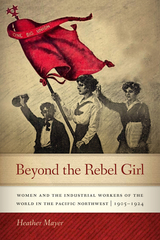
Beyond the Rebel Girl
Women and the Industrial Workers of the World in the Pacific Northwest, 1905-1924
Heather Mayer
Oregon State University Press, 2018
More than a century after their founding in 1905, the Industrial Workers of the World—or Wobblies as they are commonly known—remain a popular subject for study and discussion among students of labor history and social justice. They are often portrayed as lovable underdogs, with their songs and cartoons, generally irreverent attitude, and stalwart courage in the face of systemic persecution from vigilantes, law enforcement, and government officials.
In Beyond the Rebel Girl, historian Heather Mayer questions the well-worn vision of Wobblies as young, single, male, itinerant workers. While such workers formed a large portion of the membership, they weren’t the whole picture. In small towns across the Northwest, and in the larger cities of Seattle, Portland, and Spokane, women played an integral role in Wobbly life. Single women, but also families—husband and wife Wobbly teams—played important roles in some of the biggest fights for justice. IWW halls in these Northwest cities often functioned as community centers, with family-friendly events and entertainment.
Women were drawn to the IWW for its radical vision, inclusionary policies, birth control advocacy, and emphasis on freedom of choice in marriage. The IWW also offered women an avenue for activism that wasn’t focused primarily on the fight for suffrage. Beyond the Rebel Girl deepens our understanding of how the IWW functioned and how the union supported women in their fight for birth control, sexual emancipation, and better labor conditions, all while facing persecution at the local, state, and federal levels.
In Beyond the Rebel Girl, historian Heather Mayer questions the well-worn vision of Wobblies as young, single, male, itinerant workers. While such workers formed a large portion of the membership, they weren’t the whole picture. In small towns across the Northwest, and in the larger cities of Seattle, Portland, and Spokane, women played an integral role in Wobbly life. Single women, but also families—husband and wife Wobbly teams—played important roles in some of the biggest fights for justice. IWW halls in these Northwest cities often functioned as community centers, with family-friendly events and entertainment.
Women were drawn to the IWW for its radical vision, inclusionary policies, birth control advocacy, and emphasis on freedom of choice in marriage. The IWW also offered women an avenue for activism that wasn’t focused primarily on the fight for suffrage. Beyond the Rebel Girl deepens our understanding of how the IWW functioned and how the union supported women in their fight for birth control, sexual emancipation, and better labor conditions, all while facing persecution at the local, state, and federal levels.
[more]
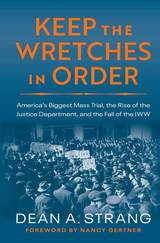
Keep the Wretches in Order
America's Biggest Mass Trial, the Rise of the Justice Department, and the Fall of the IWW
Dean A. Strang
University of Wisconsin Press, 2020
Before World War I, the government reaction to labor dissent had been local, ad hoc, and quasi-military. Sheriffs, mayors, or governors would deputize strikebreakers or call out the state militia, usually at the bidding of employers. When the United States entered the conflict in 1917, government and industry feared that strikes would endanger war production; a more coordinated, national strategy would be necessary. To prevent stoppages, the Department of Justice embarked on a sweeping new effort—replacing gunmen with lawyers. The department systematically targeted the nation’s most radical and innovative union, the Industrial Workers of the World, also known as the Wobblies, resulting in the largest mass trial in U.S. history.
In the first legal history of this federal trial, Dean Strang shows how the case laid the groundwork for a fundamentally different strategy to stifle radical threats, and had a major role in shaping the modern Justice Department. As the trial unfolded, it became an exercise of raw force, raising serious questions about its legitimacy and revealing the fragility of a criminal justice system under great external pressure.
In the first legal history of this federal trial, Dean Strang shows how the case laid the groundwork for a fundamentally different strategy to stifle radical threats, and had a major role in shaping the modern Justice Department. As the trial unfolded, it became an exercise of raw force, raising serious questions about its legitimacy and revealing the fragility of a criminal justice system under great external pressure.
[more]
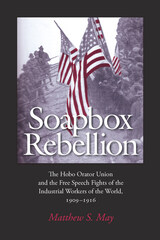
Soapbox Rebellion
The Hobo Orator Union and the Free Speech Fights of the Industrial Workers of the World, 1909-1916
Matthew S. May
University of Alabama Press, 2013
Soapbox Rebellion, a new critical history of the free speech fights of the Industrial Workers of the World (IWW), illustrates how the lively and colorful soapbox culture of the “Wobblies” generated novel forms of class struggle.
From 1909 to 1916, thousands of IWW members engaged in dozens of fights for freedom of speech throughout the American West. The volatile spread and circulation of hobo agitation during these fights amounted to nothing less than a soapbox rebellion in which public speech became the principal site of the struggle of the few to exploit the many. While the fights were not always successful, they did produce a novel form of fluid union organization that offers historians, labor activists, and social movement scholars a window into an alternative approach to what it means to belong to a union. Matthew May coins the phrase “Hobo Orator Union” to characterize these collectives.
Soapbox Rebellion highlights the methodological obstacles to recovering a workers’ history of public address; closely analyzes the impact of hobo oratorical performances; and discusses the implications of the Wobblies’ free speech fights for understanding grassroots resistance and class struggle today—in an era of the decline of the institutional business union model and workplace contractualism.
[more]

We Shall Be All
A History of the Industrial Workers of the World (abridged ed.)
Melvyn Dubofsky
University of Illinois Press, 2000
This is the classic history of the Industrial Workers of the World, the influential band of labor militants whose activism mobilized America's poorest and most marginalized workers in the years before World War I.
Originally published in 1969, Melvyn Dubofsky's We Shall Be All has remained the definitive archive-based history of the IWW. While much has been written on aspects of the IWW's history in the past three decades, nothing has duplicated or surpassed this authoritative work. The present volume, an abridged version of this labor history classic, makes the compelling story of the IWW accessible to a new generation of readers.
In its heyday, between 1905 and 1919, the IWW nourished a dream of a better America where poverty-–material and spiritual–-would be erased and where all people, regardless of nationality or color, would walk free and equal. More than half a century ago the Wobblies tried in their own ways to grapple with issues that still plague the nation in a more sophisticated and properous era. Their example has inspired radicals in America and abroad over the greater part of a century
Originally published in 1969, Melvyn Dubofsky's We Shall Be All has remained the definitive archive-based history of the IWW. While much has been written on aspects of the IWW's history in the past three decades, nothing has duplicated or surpassed this authoritative work. The present volume, an abridged version of this labor history classic, makes the compelling story of the IWW accessible to a new generation of readers.
In its heyday, between 1905 and 1919, the IWW nourished a dream of a better America where poverty-–material and spiritual–-would be erased and where all people, regardless of nationality or color, would walk free and equal. More than half a century ago the Wobblies tried in their own ways to grapple with issues that still plague the nation in a more sophisticated and properous era. Their example has inspired radicals in America and abroad over the greater part of a century
[more]
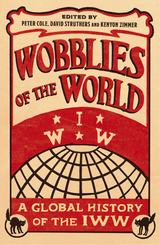
Wobblies of the World
A Global History of the IWW
Edited by Peter Cole, David Struthers, and Kenyon Zimmer
Pluto Press, 2017
“As a second-generation member of the IWW, I am delighted to see this outstanding collection of essays on the Wobblies, their achievements, and their substantial impact despite severe repression”—Noam Chomsky
Founded in 1905, Chicago's Industrial Workers of the World (IWW) is a union unlike any other. With members affectionately called "Wobblies" and an evolutionary and internationalist philosophy and tactics, it rapidly grew across the world. Considering the history of the IWW from an international perspective for the first time, Wobblies of the World brings together a group of leading scholars to present a lively collection of accounts from thirteen diverse countries, revealing a fascinating story of anarchism, syndicalism, and socialism. Chapters include:
*”A Cosmopolitan Crowd”: Transnational Anarchists, the IWW and the American Radical Press by Kenyon Zimmer
*Living Social Dynamite: Early Twentieth-Century IWW-South Asia Connections by Tariq Khan
*IWW Internationalism and Interracial Organizing in the Southwestern United States by David M. Struthers
*Spanish Anarchists and Maritime Workers in the IWW by Bieito Alonso
*The IWW and the Dilemmas of Labor Internationalism by Wayne Thorpe
*Wobblies Down Under: The IWW in Australia by Verity Burgmann
*Ki Nga Kaimahi Maori ('To All Maori Workers'): The New Zealand IWW and the Maori by Mark Derby
*Patrick Hodgens Hickey and the IWW: A Transnational Relationship by Peter Clayworth
*Edith Frenette: A Transnational Radical Life by Heather Mayer
*Tom Barker and Revolutionary Europe by Paula de Angelis
*P. J. Welinder and “American Syndicalism” in Interwar Sweden by Johan Pries
*Tramp, Tramp, Tramp: The Songs of Joe Hill Around the World by Bucky Halker
*And much, much more!
Drawing on many important figures of the movement—Har Dayal, James Larkin, William D. "Big Bill" Haywood, Enrique Flores Magón, and more—the contributors describe how the IWW and its ideals spread, exploring the crucial role the IWW played in industries such as shipping, mining, and agriculture.
Ultimately, the book illuminates Wobblie methods of organizing, forms of expression, practices, and transnational issues, offering a fascinating alternative history of the group
Founded in 1905, Chicago's Industrial Workers of the World (IWW) is a union unlike any other. With members affectionately called "Wobblies" and an evolutionary and internationalist philosophy and tactics, it rapidly grew across the world. Considering the history of the IWW from an international perspective for the first time, Wobblies of the World brings together a group of leading scholars to present a lively collection of accounts from thirteen diverse countries, revealing a fascinating story of anarchism, syndicalism, and socialism. Chapters include:
*”A Cosmopolitan Crowd”: Transnational Anarchists, the IWW and the American Radical Press by Kenyon Zimmer
*Living Social Dynamite: Early Twentieth-Century IWW-South Asia Connections by Tariq Khan
*IWW Internationalism and Interracial Organizing in the Southwestern United States by David M. Struthers
*Spanish Anarchists and Maritime Workers in the IWW by Bieito Alonso
*The IWW and the Dilemmas of Labor Internationalism by Wayne Thorpe
*Wobblies Down Under: The IWW in Australia by Verity Burgmann
*Ki Nga Kaimahi Maori ('To All Maori Workers'): The New Zealand IWW and the Maori by Mark Derby
*Patrick Hodgens Hickey and the IWW: A Transnational Relationship by Peter Clayworth
*Edith Frenette: A Transnational Radical Life by Heather Mayer
*Tom Barker and Revolutionary Europe by Paula de Angelis
*P. J. Welinder and “American Syndicalism” in Interwar Sweden by Johan Pries
*Tramp, Tramp, Tramp: The Songs of Joe Hill Around the World by Bucky Halker
*And much, much more!
Drawing on many important figures of the movement—Har Dayal, James Larkin, William D. "Big Bill" Haywood, Enrique Flores Magón, and more—the contributors describe how the IWW and its ideals spread, exploring the crucial role the IWW played in industries such as shipping, mining, and agriculture.
Ultimately, the book illuminates Wobblie methods of organizing, forms of expression, practices, and transnational issues, offering a fascinating alternative history of the group
[more]
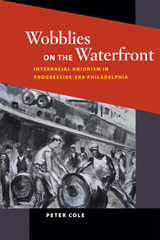
Wobblies on the Waterfront
Interracial Unionism in Progressive-Era Philadelphia
Peter Cole
University of Illinois Press, 2007
During the 1910s and 1920s, the Philadelphia waterfront was home to the most durable interracial, multiethnic union seen in the United States prior to the Congress of Industrial Organizations (CIO) era. For much of its time, Local 8's majority was African American and included immigrants from Eastern Europe as well as many Irish Americans. In this important study, Peter Cole examines how Local 8, affiliated with the Industrial Workers of the World (IWW), accomplished what no other did at the time. He also shows how race was central not only to the rise but also to the decline of Local 8, as increasing racial tensions were manipulated by employers and federal agents bent on the union's destruction.
[more]
READERS
Browse our collection.
PUBLISHERS
See BiblioVault's publisher services.
STUDENT SERVICES
Files for college accessibility offices.
UChicago Accessibility Resources
home | accessibility | search | about | contact us
BiblioVault ® 2001 - 2024
The University of Chicago Press









